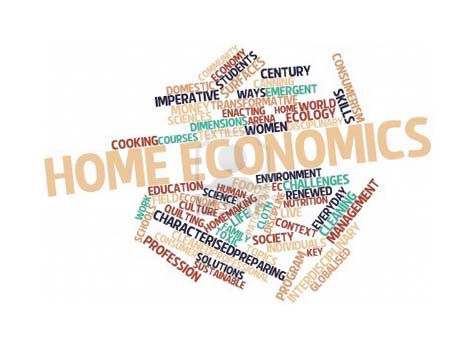Introduction To Home Economics JSS1: Meaning & Branches
Meaning of Home Economics
Some people think Home Economics involves only the act of cooking and sewing, while others believe that it involves some activities such as child-rearing and the art of fashion designing. These do not give the exact meaning of Home Economics.

Home Economics is a field of study that helps to develop knowledge, skill and attitudes in the learners in the following areas:
a. Family living;
b. Food and nutrition;
c. Clothing, fashion and grooming; and
d. Home management.
It is also a field of study that provides necessary knowledge for guiding and assisting individuals and families towards achieving a better family life.
Home Economics therefore, is the study of everything that helps to improve the home and the family within the areas of home management, food and nutrition and family living.
Different areas/branches of Home Economics
Home Economics at the secondary school level is made up of the following major branches or aspects:
a. Food and nutrition;
b. Clothing and textile; and
c. Home management.
A. Food and Nutrition
This major area is divided into three:
a. Food;
b. Nutrition; and
c. Food preparation
Food
This includes anything we eat to satisfy our appetite, to supply energy and to maintain all body processes.
They are in different classes such as:
a. Starch: Examples are yam, rice, maize, guinea corn, etc.
b. Legumes: These include cowpeas and soya beans.
c. Vegetables and Spices: These include tomatoes, pepper, garden egg, etc.
d. Oils: These include palm oil, coconut oil and groundnut oil.
Nutrition
Nutrition includes the study of different kinds of nutrients obtained from the food we eat.
They are:
a. Carbohydrates/Starch: These are energy-giving foods such as garri/eba, amala, fufu, pounded yam and sugar.
b. Proteins: This is derived from foods like beans, fish and meat.
c. Fats and Oils: These are nutrients obtained from palm oil, groundnut oil and fats from meats
d. Vitamins: These are different kinds of nutrients obtained from fruits and vegetables e.g. cabbage, ewedu, okro, orange, etc. They help to fight diseases.
e. Minerals: These are nutrients required by the body to maintain good health. They are obtained from crop plant, meat, fish, bones and salt.
Food Preparation and Management
This aspect involves buying food crops, using utensils and other cooking tools and applying special methods for preparing food for eating.
Food preparation and management also includes the care of the kitchen and the utensils used before and after cooking and eating.
B. Clothing and Textile
This is a major area of Home Economics. lts minor aspects are:
1. Clothing: This includes coverings and garments intended to be worn on the human body. This area of Home Economics involves stitches and sewing of fabrics, care of fabrics as well as grooming.
2. Textile: This involves the study of fibres and how they are converted into yarns and fabrics. There are two aspects in the study of textile. These are natural fibre such as cotton.
We also have the man-made synthetic fibre such as nylon. Textile also involves weaving and house craft such as knitting, crocheting, tie and die.
C. Home Management
This is an important area of Home Economics. It involves the study of the following:
1. Child development: This is the study of the growth and development of the child from pregnancy.
2. Family living: This involves the study of the family and the responsibility of individual members of the family.
3. Care of the home or house we live in: This involves way by which we take care of our homes.
4. Consumer Education: This teaches people how to make wise decision when buying and managing food items.
5. Laundry: This is about care of the clothes we wear.
6. Care of the body: This is about grooming (maintenance of the cleanliness and appearance of the body, like skin, hair, nails, etc).
7. Adolescent and boy/girl relationship: This involves the way a boy and girl feel about, care for, and behave towards each other.
Each of the aspects mentioned above forms a major area of the study in Home Economics.
Relationship of Home Economics with other Subjects
Home Economics is closely related to all the following subjects: Mathematics, Physics. Chemistry, Biology, Sociology, Geography, Economics. Computer Science, Fine and Applied Arts. Languages, Marketing, Accounting and Mass Communication
Home Economics makes use of the knowledge acquired in all these subjects to improve home-making and family living.
Knowledge of Chemistry is helpful in the study of food and nutrition, manufacture of cosmetics for fashion and grooming, manufacture of soaps, detergents and bleaches in bathing our body and in laundry services.
Mathematics is useful in counting with reference to measuring of solid, weighing, measuring liquids and gases and measuring clothing.
Physics is useful in lighting the home, storage and cooking in the kitchen and operating television and radio sets.
Biology is useful in understanding the crops we eat and functions of food nutrients in the body. It is also useful in the study of child development.
Sociology is useful in the study of family living.
Economics is useful in buying and selling of food crops. It is also useful in money, time and energy management as well as in understanding of consumer education.
Fine and Applied Arts is useful in interior decoration of the home.
Geography is useful in understanding of home environment and landscaping to make the home environment beautiful.
Computer Science makes advertising of Home Economics programme. goods and services on the internet and also electronic mail possible.
Accounting is relevant to Home Economics because it teaches the keeping of simple records such as cash-book, inventory and production records.
The knowledge of Marketing makes it possible to advertise Home Economics activities through marketing channels such as bill boards and jingles.
Mass Communication makes it possible to /send messages and information on Home Economics activities and jobs to people through table telephone, mobile phone, newspaper, television and radio.